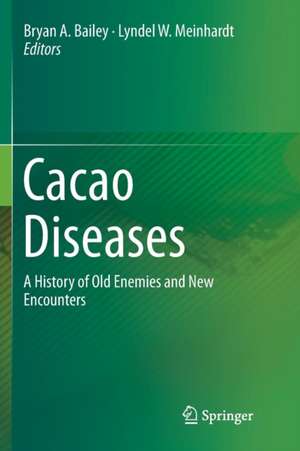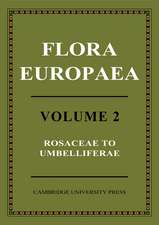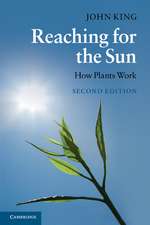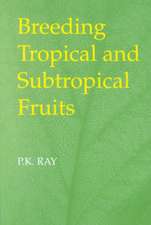Cacao Diseases: A History of Old Enemies and New Encounters
Editat de Bryan A. Bailey, Lyndel W. Meinhardten Limba Engleză Paperback – 7 apr 2018
Topics discussed include the history, biology and genetic diversity of Moniliophthora species (which cause witches’ broom and frosty pod rot) and Phytophthora species (which cause black pod rot) that cause diseases resulting in major losses to cacao production. Emerging pathogens such as Cacao swollen shoot virus and Ceratobasidium theobromae (which causes vascular streak dieback) are also discussed in detail, along with many pathogens of significant local concern. Most of these pathogens represent major risks to global cacao production should they expand into new areas, breaking out of their current limited distributions. By considering cacao diseases as a group, similarities in the available tools and techniques used in their management become apparent, as do their limitations. Gaps in our current knowledge of cacao pathogens and the management of the diseases they cause are detailed, and suggestions for future research directions are provided. This insight allows readers to consider cacao disease threats from a more comprehensive, global perspective and paves the way for an improved synergy of efforts between the various research programs, agencies, and industries, both private and public, with vested interests in cacao production, and cacao farmers.
| Toate formatele și edițiile | Preț | Express |
|---|---|---|
| Paperback (1) | 941.62 lei 43-57 zile | |
| Springer International Publishing – 7 apr 2018 | 941.62 lei 43-57 zile | |
| Hardback (1) | 947.79 lei 43-57 zile | |
| Springer International Publishing – 2 mar 2016 | 947.79 lei 43-57 zile |
Preț: 941.62 lei
Preț vechi: 1148.32 lei
-18% Nou
Puncte Express: 1412
Preț estimativ în valută:
180.21€ • 187.19$ • 149.69£
180.21€ • 187.19$ • 149.69£
Carte tipărită la comandă
Livrare economică 03-17 februarie 25
Preluare comenzi: 021 569.72.76
Specificații
ISBN-13: 9783319796796
ISBN-10: 3319796798
Ilustrații: XIII, 633 p. 79 illus., 71 illus. in color.
Dimensiuni: 155 x 235 mm
Greutate: 0.89 kg
Ediția:Softcover reprint of the original 1st ed. 2016
Editura: Springer International Publishing
Colecția Springer
Locul publicării:Cham, Switzerland
ISBN-10: 3319796798
Ilustrații: XIII, 633 p. 79 illus., 71 illus. in color.
Dimensiuni: 155 x 235 mm
Greutate: 0.89 kg
Ediția:Softcover reprint of the original 1st ed. 2016
Editura: Springer International Publishing
Colecția Springer
Locul publicării:Cham, Switzerland
Cuprins
Part I The crop and its pathogens.- Part II Moniliophthora roreri and Moniliophthora perniciosa: history and biology.- Part III Phytophthora spp. causal agents of black pod rot.- Part IV Pathogens of expanding concern.- Part V Pathogens of local concern and potential to spread.- Part VII Non-microbial maladies of cacao.- Part VIII Disease Management.
Notă biografică
Textul de pe ultima copertă
This book reviews the current state of knowledge concerning cacao pathogens and methods for their management. Topics discussed include the history, biology and genetic diversity of Moniliophthora (which causes witches’ broom and frosty pod rot) and Phytophthora species (which causes black pod rot) that cause diseases resulting in major losses to cacao production. Emerging pathogens such as Cacao swollen shoot virus and Ceratobasidium theobromae (which causes vascular streak dieback) are also discussed in detail, along with many pathogens of significant local concern. Most of these pathogens represent major risks to global cacao production should they expand into new areas, breaking out of their current limited distributions. By considering cacao diseases as a group, similarities in the available tools and techniques used in their management become apparent, as do their limitations. Gaps in our current knowledge of cacao pathogens and the management of the diseases they cause are detailed, and suggestions for future research directions are provided. This insight allows readers to consider cacao disease threats from a more comprehensive, global perspective and paves the way for an improved synergy of efforts between the various research programs, agencies, and industries, both private and public, with vested interests in cacao production, and cacao farmers.
Caracteristici
Identifies gaps in our knowledge concerning cacao diseases and suggests future directions for research Includes emerging pathogens of cacao with yet-unknown potential Describes different approaches to disease management Includes supplementary material: sn.pub/extras








